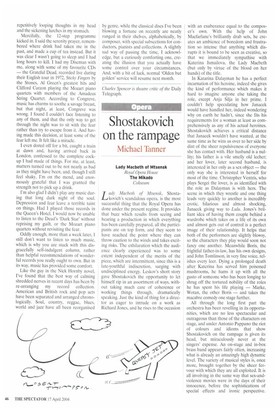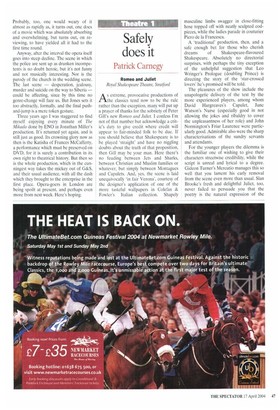Shostakovich on the rampage
Michael Tanner
Lady Macbeth of Mtsensk Royal Opera House The Mikado Coliseum
I lad), Macbeth of Mtsensk, Shostai kovich's scandalous opera, is the most successful thing that the Royal Opera has done under the present regime. It provides that buzz which results from seeing and hearing a production in which everything has been carefully prepared, all the participants are on top form, and they seem to have reached the point where they can throw caution to the winds and takes exciting risks. The exhilaration which the audience clearly experienced was to some extent independent of the merits of the piece, which are intermittent, since this is a late-youthful indiscretion, surging with undisciplined energy. Leskov's short story gave Shostakovich the opportunity to let himself rip in an assortment of ways, without taking much care of coherence or working things through, dramatically speaking. Just the kind of thing for a director as eager to intrude on a work as Richard Jones, and he rises to the occasion
with an exuberance equal to the composer's own. With the help of John Macfarlane's brilliantly drab sets, he creates an ambience of boredom and frustration so intense that anything which disrupts it is bound to be seen as creative, so that we immediately sympathise with Katerina Ismailova, the Lady Macbeth (but only by virtue of the blood on her hands) of the title.
In Katarina Dalayman he has a perfect incarnation of his heroine, indeed she gives the kind of performance which makes it hard to imagine anyone else taking the role, except Anja Silja in her prime. I couldn't help speculating how Janacek would have handled her, indeed wondering why on earth he hadn't, since she fits his requirements for a woman at least as comprehensively as any of his actual heroines. Shostakovich achieves a critical distance that Janacek wouldn't have wanted, at the same time as he wins us over to her side by dint of the sheer repulsiveness of everyone she has contact with. Her husband is a nullity; his father is a vile smelly old lecher; and her lover, later second husband, is interested in her only as a sex object — the only way she is interested in herself for most of the time. Christopher Ventris, who plays Sergei the lover, is as identified with the role as Dalayman is with hers. The scene in which they wrestle and one thing leads very quickly to another is incredibly erotic, hilarious and almost shocking, Janacek giving way to Lulu. Jones's brilliant idea of having them couple behind a wardrobe which takes on a life of its own and almost gets out of control is a perfect image of their relationship. It helps that both of the performers are slightly blowsy, so the characters they play would soon not fancy one another. Meanwhile Boris, the frightful father-in-law, has his own designs, and John Tomlinson, in very fine voice, relishes every leer. Dying a prolonged death after Katerina has served him poisoned mushrooms, he hams it up with all the gusto of someone who has been longing to shrug off the tortured nobility of the roles he has spent his life playing — Marke, Wotan, the other Boris — and takes the macabre comedy one stage further.
All through the long first part the orchestra has been revelling in its opportunities, which are no less spectacular and outrageous than those of the characters on stage, and under Antonio Pappano the riot of colours and idioms that show Shostakovich on the rampage is given its head, but miraculously never at the singers' expense. An on-stage and in-box brass band appears fairly often, increasing what is already an amazingly high dynamic level. The variety of musical styles is, once more, brought together by the sheer fervour with which they are all exploited. It is all involving in the same way that sex-andviolence movies were in the days of their innocence, before the sophistications of special effects and ironic perspective. Probably, too, one would weary of it almost as rapidly as, it turns out, one does of a movie which was absolutely absorbing and overwhelming, but turns out, on reviewing, to have yielded all it had to the first time round, Anyway, after the interval the opera itself goes into steep decline. The scene in which the police are sent up as drunken incompetents is no doubt heroic, but it's not funny and not musically interesting. Nor is the parody of the church in the wedding scene. The last scene — desperation, jealousy, murder and suicide on the way to Siberia — could be affecting, since by this time no genre-change will faze us. But Jones sets it too abstractly, formally, and the final pushand-jump is a mere token gesture.
Three years ago I was staggered to find myself enjoying every minute of The Mikado done by ENO in Jonathan Miller's production. It's returned yet again, and is still just as good. Its crowning glory now as then is the Katisha of Frances McCafferty, a performance which must be preserved on DVD, for it is surely a contribution in its own right to theatrical history. But then so is the whole production, which in the cunningest way takes the mickey out of G&S, and their usual audience, with all the dash which they brought to the enterprise in the first place. Opera-goers in London are being spoilt at present, and perhaps even more from next week. Here's hoping.



































































 Previous page
Previous page